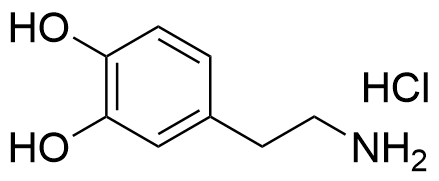Binding Properties
| 𝜈 | Molecule 1 : 1 Host | ||
| Ka = | 161.0 | ± 25.76 | M-1 |
| Kd = | |||
| logKa = | |||
| T | 25.0 °C | ||
| Energy | kJ mol-1 | kcal mol-1 | |||
|---|---|---|---|---|---|
| ΔG | = | -12.6 | ± 0.4 | -3.01 | ± 0.1 |
These are the specifications of the determination of the experimental results.
| Detection Method: | Direct | ||
| Assay Type: | Direct Binding Assay | ||
| Technique: | Nuclear Magnetic Resonance | ||
| Nucleus | 1H | ||
| = | 0.32 ppm | ||
Detailed information about the solvation.
| Solvent System | Single Solvent |
| Solvent | Deuterium Oxide |
Please find here information about the dataset this interaction is part of.
| Citation: |
J. Kim, B. Raman, K. H. Ahn, SupraBank 2026, Artificial Receptors That Provides a Preorganized Hydrophobic Environment: A Biomimetic Approach to Dopamine Recognition in Water (dataset). https://doi.org/10.34804/supra.20210928159 |
| Link: | https://doi.org/10.34804/supra.20210928159 |
| Export: | BibTex | RIS | EndNote |
Please find here information about the scholarly article describing the results derived from that data.
| Citation: |
J. Kim, B. Raman, K. H. Ahn, J. Org. Chem. 2005, 71, 38–45. |
| Link: | https://doi.org/10.1021/jo051630s |
| Export: | BibTex | RIS | EndNote | |
Binding Isotherm Simulations
The plot depicts the binding isotherm simulation of a 1:1 interaction of Dopamine hydrochloride (0.12422360248447205 M) and 1,3,5-tris[[(4s)-4-[3-[4-(sodiosulfo)butoxy]phenyl]-2-oxazoline-2-yl]methyl]-2,4,6-trimethylbenzene (0 — 0.2484472049689441 M).
Please sign in: customize the simulation by signing in to the SupraBank.




